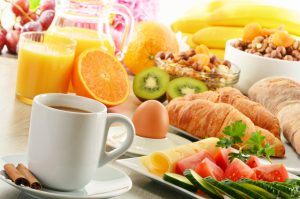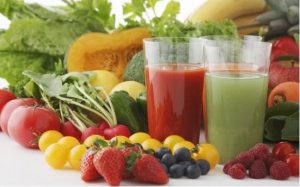Good study habits are a key ingredient to success in school. You know that a healthy diet supports your studies by helping you concentrate better. The average college student is often pressed for time, under a lot of stress, and eating on the go. You may find it difficult to avoid bad habits like skipping meals or frequently visiting fast food restaurants with some friends. Right ?
You can realize your greatest academic potential by eating certain foods and following particular eating patterns for their brain-boosting benefits. Here we are talking about healthy diet during study life. Eating a healthy diet can help you feel better, cope with stress, and perform better in the classroom and on the athletic field.
It’s making a super fast breakfast to optimize your brain function, but also getting smart with your snacks and knowing what your brain needs for lunch and dinner.
It really isn’t that hard to get started.
Start your day with some brain food for breakfast:
Oatmeal
Oatmeal mixed with 1 tablespoon flax seeds, 1 teaspoon peanut butter, sliced banana or other fresh fruit, and some walnuts or almonds on top. Flaxseeds are an excellent source of alpha-linolenic acid , a healthy fat that boosts cerebral cortex function.
Eggs
They are a powerful mix of B vitamins (they help nerve cells to burn glucose), antioxidants (they protect neurons against damage), and omega-3 fatty acids (they keep nerve cells functioning at optimal speed).
Smoothie with berries and beets.
The natural nitrates in beets can increase blood flow to your brain, improving mental performance. In a blender, combine 1/2 cup of orange juice, 1 cup frozen berries (strawberries, raspberries, blueberries), 1/2 cup diced beets (raw or roasted), 1 tablespoon granola, 2–3 dates, 1/4 cup coconut water or plain low-fat yogurt, and 3 ice cubes. Blend for one minute.
Yogurt with fresh fruit and granola.
Layer 1/2 cup of yogurt, 1 tablespoon granola, 1 cup fresh fruit (sliced or diced), and a spoonful of nuts such as walnuts and almonds. Almonds are beneficial for increased attention and awareness necessary for 
learning, as well as restoring memory and cognitive function.
This all about starting your day with a healthy breakfast. Let’s talk about some snacks. We know that in student life snacks are more importance than breakfast and lunch. All the students are aware with that they are very serious with their snacks that they are regularly taking. That is why we should take care of meals which are regularly used in our life. You can use snacks to get energy and focus better:
Snacks to get energy and focus better
Fresh fruit.
We don’t miss the chance to take fruit at any position right? Rich in vitamin C, fruit boosts mental agility and reduces the decline in the brain’s cognitive abilities. Eat it whole (apple, banana, tangerine, pear, peach) or dice several different types of fruit and eat as a fruit salad (watermelon, papaya, mango, berries, cantaloupe, oranges, grapefruit, pineapple).
A fruit and nut mix.
If you are thinking about variations of fruit then you can choose this. Prepare it ahead of time and bring it with you to school or work; it’s great for an energy boost when you feel that mid-afternoon slump. Mix up a tablespoonful each of walnuts, hazelnuts, almonds, cashews, sunflower seeds, pumpkin seeds, raisins, figs, dates, dried apricots or peaches.
Walnuts.
This is another great options. This powerful brain food improves cognitive function and can even reduce memory loss. You need less than a handful for maximum effect.
Boost your brain power with lunch and dinner
Let’s talk about lunch and dinner. While starting your day with a great and healthy breakfast students should take care to their lunch and dinner. As you know, that lunch and dinner make an important role to survive here is some tips for lunch and dinner.
Seafood.
Grill, bake or saute salmon, mackerel, kippers, or trout. These are considered oily fish with high levels of omega-3 fatty acids that contribute to healthy brain function and reducing memory loss.
Sweet potatoes.
They are rich in the powerful antioxidant beta-carotene, which has been linked to a boost in the brain’s cognitive function. You can steam or boil them much like regular potatoes, or you can cut them into strips and bake in the oven to make sweet potato fries (spice them up with crushed or smoked paprika, pepper, thyme, oregano).
Whole grains
Rich in complex carbohydrates, fiber, and omega 3 fatty acids, whole grains release glucose slowly into the bloodstream so that your brain gets a steady boost of energy. They can also promote mental alertness and improve your overall mood.
Carrots and squash
When you like carrots then it will nice. Much like sweet potatoes, carrots and all types of squash are rich in beta carotene, which helps improve memory and verbal skills. You can eat carrots raw, or you can steam or bake them.

Healthy Eating Tips for the Busy Student
If you must eat fast foods, choose wisely
You can find some healthy fast food also. Choose pizza with half the cheese, a regular size roast beef sandwich, baked potato, or green salad with reduced calorie dressing. Limit high fat offerings like French fries, fried chicken, or fish sandwiches and watch out for salad dressing!
check Switch Out These Fast Foods To Be Healthier
General Tips for Students for Healthy Eating
Drink lots of water
Your body needs at least eight glasses a day, and, if you exercise vigorously, you may need more. To remind yourself, carry a water bottle along to class and keep it handy during late night study sessions.
Eat plenty of foods rich in calcium
People in their early twenties need to be building up stores of calcium in their bodies to prevent osteoporosis later in life. If you don’t like milk, try to include ample amounts of low-fat yogurt, low-fat cheese, and green leafy vegetables in your diet.
If you need to lose weight, do it sensibly
Starvation and/or diets that offer a quick fix usually backfire and are harmful. There is no truth to the theories that suggest eating foods in any particular combination will promote weight loss. The only safe way to lose weight, feel good while doing it, and keep it off, is to eat a balanced diet and exercise.
Keep healthy snacks on hand
This way, if hunger strikes during a late night study session, you won’t be tempted by vending machine candy, chips, or ice cream. Possibilities include fresh or dried fruit, pretzels, unbuttered popcorn, rice cakes, or whole wheat crackers. If you have a refrigerator, consider raw vegetables with low-fat yogurt or cottage cheese dip.
Limit your sugar intake
Sugar provides calories in your diet but few other nutrients, and it contributes significantly to tooth decay. Use it sparingly and consider sweetening coffee, tea, cereal, and fruit with diet sweeteners instead.
Visit the dining hall salad bar
The dining hall salad bar can be either an asset or a detriment to your diet depending on how you choose from it. Of course, leafy greens, raw vegetables, and fresh fruits are beneficial. But, if you choose a lot of creamy dressings, bacon bits, and mayonnaise-based salads, the calories and fat may equal or even exceed those of a burger and fries—so choose wisely!
Limit your alcohol intake
If you drink alcohol, keep in mind that it supplies calories but no nutritional value. A light beer, a glass of wine, or an ounce of liquor each has about 100 calories. There may also be health problems associated with drinking alcohol.
Enjoy your food
Food is a lot more than nourishment for our bodies, so take the time to enjoy and savor it!

